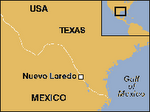By Frank Levine
CIUDAD JUAREZ, Mexico,May 18--Although Mexican law enforcement officials claim they've arrested most, if not all, of those allegedly responsible for the killing and torture of hundreds of young women in Juarez in recent years, skepticism remains among human rights activists and relatives of the victims, that the killers are actually behind bars -- preferring, instead, to believe that most recent killings indicate that at least one serial killer remains at large, possibly finding sanctuary in El Paso, Texas, just across the border.
The story of the murders is a long and grisly one. More than 400 women and girls have been killed and tortured in Juarez since 1993, with most of their bodies brutalized and dumped in shallow desert graves. An additional 70 women are missing, according to local women's rights activists and government sources.
"We have no indication that any serial killer travels to and from the United States," said one former Federal Judicial Police investigator, who prefers anonymity."But the rhythm of the killings may indicate that at least one killer may be leaving the area on a consistent basis."
The cross-border theory has been bounced around for more than a decade--ever since an unmistakable pattern of torture-killings developed in the early 1990s. Lending credence, are unconfirmed reports that at least one individual has been scrutinized as a possible suspect by investigators on the U.S. side of the border.
At first, Mexican law enforcement officials all but ignored the murders; however, after mounting public and political pressure, they began looking at co-workers, bus and taxi drivers--people who would have access to the women when they were returning home late at night after finishing their shifts at some the dozens of so-called "in-bond" factories and assembly plants in Juarez. Most of the victims were poor and uneducated. They migrated to Juarez for the dream of a decent job and better life than in the crushing poverty of Mexico's interior. Finally, after years of frustration and some questionable well-publicized arrests, local police began looking at themselves for possible suspects and clues.
According to recent published reports and North American Free Trade Agreement documents, about 80 Fortune 500 companies have facilities in the Ciudad Juarez area. Among them are, Alcoa, 3M,General Electric, Du Pont, Thomson RCA, Honeywell, Amway, Ford,TDK and Kenwood.
Meanwhile, in response to continuing tragedy, both the United States House and Senate last week passed resolutions condemning the continuing abductions, torture and murder of women in Juarez. The legislators, while commending the Mexican government for its recent actions to help stop the killings, also agreed that much more must be done.
Friday, May 19, 2006
Possible US serial killer in Juarez slayings?
Posted by
Frank Levine
at
02:29
1 comments
![]()
Labels: in-bond factories, juarez, mexico, NAFTA, serial killer
Subscribe to:
Posts (Atom)






